The story of the Morrigan
Reading time: 8 min
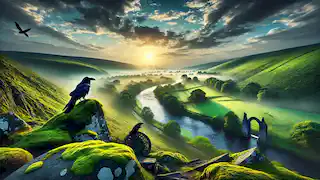
About this story: The story of the Morrigan is a Myth from Ireland set in the Ancient This Dramatic tale explores themes of Courage and is suitable for All Ages. It offers Cultural insights. A tale of fate, sacrifice, and the eternal power of the Morrigan in ancient Ireland.
The story of the Morrigan is one of Ireland’s greatest legends, a tale woven into the fabric of its mist-shrouded hills and sacred rivers. In the heart of the Emerald Isle, where the boundary between the mortal world and the otherworld is as thin as gossamer, her presence has lingered for centuries. She is a goddess of dualities—of life and death, war and peace, destruction and renewal. To some, she is a harbinger of doom; to others, a guide through chaos.
Her legend unfolds during a time when clans ruled the land and survival depended on strength, cunning, and the blessings of the gods. In this tale, the Morrigan’s mysterious hand shapes the fate of a proud chieftain, a thriving clan, and an Ireland teetering on the brink of war. But hers is no simple story of conflict. It is a tale of choices, sacrifices, and the eternal cycle of life and death.
The Goddess in the Mist
The year was 432 CE, a time when Ireland’s verdant hills echoed with the songs of druids, the clash of swords, and the whispers of gods. Among these hills lay the River Boyne, a winding, sacred waterway said to connect the mortal realm to the otherworld. The Uí Néill clan, one of the most powerful in Ireland, held dominion over this fertile land. Their chieftain, Cathal mac Fiachra, was a man revered for his strength and wisdom. But even Cathal, a warrior who had faced countless foes, could not have foreseen the storm gathering on the horizon.
One misty morning, Cathal stood on a cliff overlooking the Boyne. The air was thick with the scent of dew and wildflowers, yet an unshakable unease gnawed at him. His people prospered, their fields teeming with crops and their warriors unmatched. But prosperity bred envy, and Cathal had heard the murmurs—rival clans were rallying against him, driven by greed for the land he had worked so hard to protect.
As Cathal turned to leave, a sudden, sharp caw pierced the silence. A raven, black as midnight, perched on a nearby branch. Its gaze locked onto Cathal’s, unblinking and unsettlingly intelligent. The bird spread its wings and took to the sky, vanishing into the mist. A chill ran down Cathal’s spine, for he knew the raven was no ordinary bird. It was an omen, a sign from the gods—or perhaps from the Morrigan herself.
The Visit of the Goddess
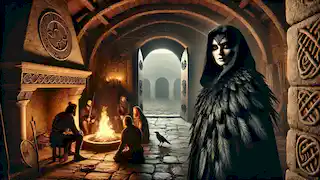
That night, as the clan gathered in their great hall, the air buzzed with tension. Warriors recounted tales of battles won and foes vanquished, while others sang songs of heroism to drown their unease. The fire roared in the center of the hall, casting flickering shadows on the stone walls.
The festivities came to an abrupt halt when the doors burst open. A woman stood in the doorway, her presence commanding and otherworldly. She was cloaked in raven feathers, and her eyes seemed to hold the secrets of the universe. She was beautiful, yet fearsome, her aura both mesmerizing and terrifying.
“I bring a message from the gods,” she announced, her voice resonant and echoing. “The land you hold dear will soon be drenched in blood. A great war approaches, and your choices will determine the fate of all.”
The hall fell silent. Warriors exchanged uneasy glances, and Cathal rose from his seat. “Who are you to bring such words of doom?” he demanded, his voice steady but his heart pounding.
The woman’s lips curled into a faint smile. “I am the Morrigan,” she said. “I am the goddess of war and fate, the weaver of destiny. My words are not doom—they are truth.”
A hush fell over the hall. The Morrigan’s reputation was well-known. She was both feared and revered, a force of nature that no mortal could ignore. Before anyone could respond, she vanished as suddenly as she had appeared, leaving behind a single raven feather.
Cathal picked up the feather, its weightless form seeming to burn in his hand. He knew that her warning was no idle threat. The future of his clan now rested on his shoulders.
Preparing for War
In the days that followed, the Uí Néill clan mobilized like never before. Warriors honed their skills, blacksmiths worked tirelessly to forge weapons, and scouts kept a vigilant watch over the borders. The women and children prepared shelters deep within the forests, ready to flee if the worst came to pass.
Cathal, however, was troubled. The Morrigan’s warning echoed in his mind, and he knew that strength alone would not ensure victory. Seeking guidance, he visited the clan’s druid, an elder named Dónal who had served as a bridge between the mortal and divine for decades.
“The Morrigan does not appear lightly,” Dónal said, his voice grave. “She is a guide, but her guidance is often veiled in riddles. You must heed her words carefully.”
“What must I do to protect my people?” Cathal asked.
Dónal stared into the flames of the hearth, his fingers tracing patterns in the ash. “You must be prepared to make sacrifices,” he said at last. “The Morrigan’s gifts are not given freely.”
That night, Cathal walked alone to the River Boyne, his thoughts heavy. As he reached the water’s edge, the moonlight illuminated a figure standing in the shallows. It was the Morrigan, her form radiant yet ethereal.
“You seek answers,” she said, her voice soft yet commanding.
“Yes,” Cathal replied. “How can I protect my people from the war you foretold?”
The Morrigan’s expression was inscrutable. “You have two paths,” she said. “You may fight, embracing the chaos and bloodshed, or you may choose a path of sacrifice. The choice is yours, but know this: no path is without cost.”
The Clash of Clans
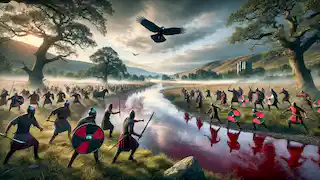
At dawn, the rival clans descended upon the Uí Néill lands. Their war cries echoed across the valley, and the ground trembled beneath the thundering hooves of their horses. The battle was fierce, with swords clashing and arrows whistling through the air. The River Boyne, once a symbol of life and prosperity, now ran red with blood.
Cathal fought at the forefront, his blade cutting through enemy ranks with precision and fury. But even as victory seemed within reach, he spotted the Morrigan perched on a nearby tree. Her raven form watched the battle with a detached, almost amused air.
As Cathal locked eyes with the bird, a vision overwhelmed him. He saw his people celebrating their triumph, only for famine and infighting to tear them apart in the years to come. The sight chilled him to his core.
“Retreat!” he shouted, his voice cutting through the chaos. “Fall back to the village!”
His warriors hesitated, bewildered by the command, but they obeyed. The enemy, too stunned to pursue, watched as the Uí Néill forces disappeared into the woods.
The Price of Peace
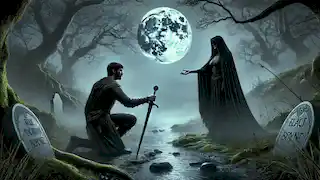
Cathal’s decision to retreat weighed heavily on him. His warriors questioned his judgment, and whispers of doubt spread through the village. But Cathal knew that the Morrigan’s warning had not been idle. To win the battle would have been to lose the future.
One night, as the village slept, Cathal returned to the River Boyne. The Morrigan appeared before him, her form now that of a crone, her hair white as bone.
“You have chosen wisely,” she said, her voice like the rustling of dead leaves. “But the path you now walk demands a great sacrifice.”
Cathal knelt before her. “What must I do?”
The Morrigan produced a dagger forged from black obsidian, its blade gleaming with an unnatural light. “You must offer your sovereignty to the land itself. Only by becoming one with the earth can you ensure its protection.”
Though he did not fully understand, Cathal took the dagger. With a final, resolute breath, he plunged it into his heart. As his life ebbed away, the Morrigan cradled him like a mother, whispering, “Your sacrifice will not be forgotten.”
The Morrigan’s Blessing
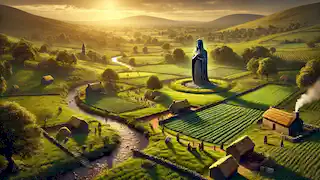
Cathal’s death marked the beginning of a new era for the Uí Néill clan. Though they mourned their chieftain, they soon found their land flourishing in ways they had never imagined. The crops grew bountifully, the rivers teemed with fish, and their enemies abandoned any thoughts of conquest.
The Morrigan’s presence faded from their lives, but her influence remained. Songs were sung of Cathal’s bravery, and the goddess’s role in guiding their fate became a cornerstone of their beliefs.
Generations later, the clan would gather by the River Boyne to honor both the Morrigan and the chieftain who had trusted her wisdom. For the goddess was not merely a harbinger of doom but a guardian of balance, ensuring that life and death, chaos and order, remained in harmony.


















